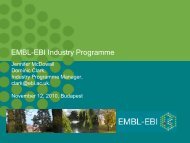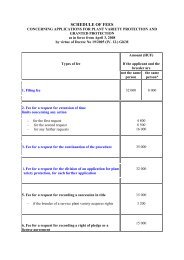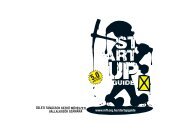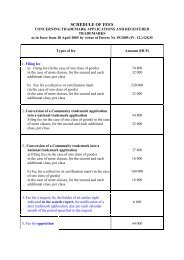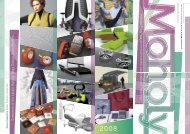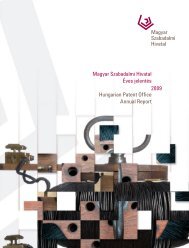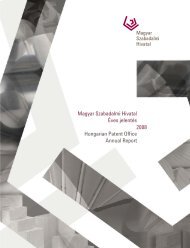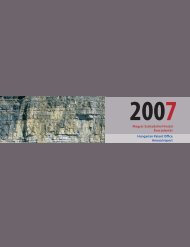Bonjour Mesdames, Messieurs,
Bonjour Mesdames, Messieurs,
Bonjour Mesdames, Messieurs,
Create successful ePaper yourself
Turn your PDF publications into a flip-book with our unique Google optimized e-Paper software.
and I quote, was “to promote throughout the Community a harmonious development<br />
of economic activities and a continuous and balanced expansion by completing an<br />
internal market which functions properly and offers conditions which are similar to<br />
those obtaining in a national market.” Does it, and I quote, “open up unrestricted<br />
economic activity in the whole of the common market for the benefit of undertakings”,<br />
as laid down in the fourth recital of the Directive?<br />
6- Our own legislation in the Benelux has been dealing with opposition proceedings only<br />
since 2004 and statistics show that Benelux applicants (mostly SMEs) are facing more<br />
and more proceedings based on a CTM ( 54.6% in the last thirteen months ) , although<br />
I want to point out once again that a CTM does not need ever to be used in the<br />
Benelux in order to be a valid registration. There are several reasons for the increase,<br />
but one could be that trade mark holders should be more alert in order to avoid falling<br />
into the trap of limitation in consequence of acquiescence, another principle of<br />
Community law (Directive, article 9). This percentage of oppositions based on a CTM<br />
is steadily and continuously increasing (by 15% up in less than two years) and there is<br />
no reason to believe that this increase will come to an end in the future. Every year,<br />
applicants for Benelux trademarks are effectively confronted with more than 100,000<br />
new CTMs (either directly through OHIM or via the Madrid Protocol), whereas the<br />
“Benelux market” itself rarely exceeds 30,000 trademark registrations (and this<br />
includes international registrations with effect in the Benelux).<br />
7- These constraints hardly encourage SMEs ,which are the very heart of the Lisbon<br />
Strategy, to file their trade mark applications on a national level, despite the fact that<br />
the Regulation starts from the principle that , and I quote, “national trade marks<br />
continue to be necessary for those undertakings which do not want protection of their<br />
trade marks at Community level”. To actually check the availability of their trade<br />
marks, SMEs must now search through three registers: the national/ Benelux register<br />
(with a requirement for use), the international register (with a requirement for use in<br />
the designated states) and above all in the Community register where tens of thousands<br />
of trade marks are registered every year and where the validity is not affected by nonuse,<br />
even over time in 26 Member-States of the Community. As I said in the case of<br />
my home country Luxembourg, it could mean up to 99.92% of the Community‟s<br />
population and 99.95% of the Community territory. This simply leads to a Lawyers’<br />
Paradise where any balance between the three registration systems has vanished. This<br />
affects all proprietors of trademarks, whether they go down the national, international<br />
or community route. It is certainly not in the spirit of the so-called “Kok report” on the<br />
Lisbon Strategy in which a High Level Group recommended that the protection of<br />
intellectual property should be made more accessible to SMEs by reducing the costs.<br />
8- This has been all the more true since the Community's accession to the Madrid<br />
Protocol in 2004, some nine years after the Declaration. This Protocol grants those<br />
Member States signatory to the Protocol easy access to the Common Market in order<br />
to assert their exclusive rights. The reverse, however, is not possible under the same<br />
conditions . Whereas businesses in China, the USA, Japan and the Russian Federation<br />
are able to use the CTM system to impose their own trade marks on Benelux<br />
companies without ever using them on Benelux territory, this is manifestly not the<br />
case for those Benelux businesses that wish to impose their rights on the same<br />
companies in their respective countries. They actually have to prove genuine use in



